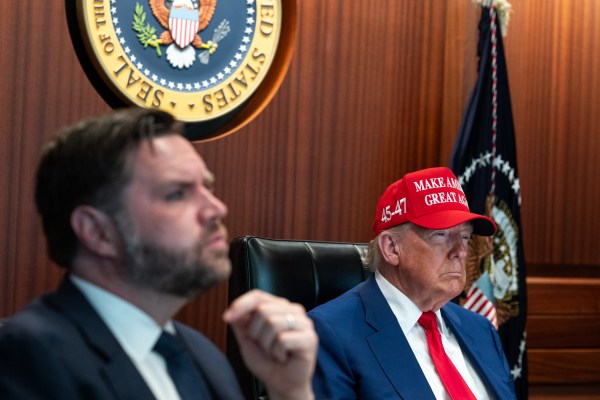Dear Reader (especially those of you taking things one step at a time),
My friend Cliff Asness is fond of tweeting his dismay over the horseshoeing of American politics when it comes to economics (and other things). One of his pithier expressions of this lament: “We now have two economically far left (and economically ignorant) parties, they just differ in their preferred pronouns.”
Now, Cliff isn’t using “pronouns” literally. His point is that the fringier economic policies of the left and the fringier economic policies of the right are substantially similar but culturally or stylistically opposed to each other. If you’re an advocate for industrial policy on the left, you’ll use different buzz-phrases and shibboleths than an advocate of industrial policy on the right will. But you’re still for industrial policy. You might have different winners and losers in mind, but you’re still picking winners and losers. Then again, sometimes, both the left and right are just haggling over the same constituency, making losers of everybody else.
For instance, in the Inflation Reduction Act the Biden administration implemented a policy of “importing” foreign price controls for pharmaceuticals under Medicare (though in horsehoe-y fairness, the Trump White House floated something similar in 2018). The Trump administration is sticking with that policy and looking to expand it. Sens. Bernie Sanders and Josh Hawley have teamed up to cap limits on credit card interest rates, something Trump ran on in 2024 (and Kamala Harris floated in 2020). In 2024, Trump proposed no taxes on tips—a terrible idea. And Harris promptly adopted the same position, pissing off Trump. Last example: For decades, Democrats have wanted to raise the top income tax rate for the highest earners. Now, Donald Trump does too.
Again, right-wingers can come up with all sorts of rationalizations for why policy X is good when Team Red does it and bad when Team Blue does it, and vice versa. That’s a very old story in Washington. The filibuster is either a bulwark against tyranny or an impediment to progress, depending on which team is in power. Judges are good when they thwart your team, but have gone “rogue” when they get in the way of mine.
What I find both amusing and fascinating is the way in which the GOP’s sudden lurch toward statism and mercantilism has left a lot of people on the right searching for a story—and the vocabulary to tell it—that doesn’t sound lefty, even as they embrace what were, until recently, nearly universally considered left-wing ideas.
Manly, patriotic MAGA types can’t use phrases like “degrowth” or “sustainability” because they’re associated with stuff like climate change and sound kind of feminine to the Jesse Watters crowd. And, besides, Donald Trump doesn’t think he’s shrinking the economy; he just thinks, wrongly, that his tariff policies will usher in a new golden age and launch the economy into the stratosphere after a “period of adjustment” where kids will have to be happy with fewer toys. So they come up with stuff that is right-wing coded, like he’s “fixing the crisis in masculinity” and liberating manly men like miners to do what they’re meant to do.
As for the story they need to tell, that’s even harder. The argument for the tariffs is that we’ve been ripped off and plundered through bad trade policies for the last half century. As Trump explained in his “Liberation Day” address, “I don’t blame these other countries at all for this calamity. I blame former presidents and past leaders who weren’t doing their job. They let it happen, and they let it happen to an extent that nobody can even believe.”
The main problem with this now-familiar tale of woe and Trumpian heroism is that it’s just not true. America’s economy, with the usual dips and downturns, has steadily improved over the last—pick your timeline—20, 30, 50, 100 years. Of course, there are downsides to this story. But they are downsides to a good story.
The economy was pretty good when Trump got elected and he made it worse and it’s just hard to come up with a coherent argument that says “the economy was terrible before Trump was elected, and now we need to make it even worse before it gets better.” It’s tough to defend austerity in the name of a president whose name is virtually synonymous with capitalist excess who promised to deliver an economic boom almost overnight if elected.
The key to reconciling these economic and political challenges lies in describing what the golden age will look like when we get there, and—surprise!—it looks like the 1950s. Not the 1950s as it was, but the 1950s we think we remember from TV.
Indeed, nostalgia for the workforce and economy of the 1950s suffuses MAGAnomics, which should not be surprising given what MAGA stands for (it ain’t “Make America Great for the First Time!”). Search social media for phrases like “We traded this for a higher GDP” or “They took this from us” and you’ll find gauzy or grainy images of happy suburban families or some other bourgeois icons or lifestyles (you’ll also find a lot of excellent mockery of such claims).
Nearly 20 years ago, Brink Lindsey chronicled in his book The Age of Abundance how, in the words of a reviewer, “Republicans want to go home to the United States of the 1950s while Democrats want to work there.” It turns out that if you talk about wanting to live there long enough, you’ll want to work there too.
Neoliberalism Uber Alles
But there is one word that has jumped the chasm from one end of the horseshoe to the other: “Neoliberal.” I like to think I know a bit about intellectual history, but I’ll be honest: I never really understood what the hell progressives thought they were doing with the term “neoliberal.” I mean, I know what it’s supposed to mean: free market economics, or a revived classical liberal economics, or privatization, or libertarianism. It’s mostly a pejorative term. And the left has used it for decades as an umbrella concept for pretty much any accusation possible—much as the left did when classical liberalism went by the term “liberalism” or “Manchester liberalism.” The extent to which neoliberalism is a catch-all for everything the left hates really can’t be exaggerated. Here’s Robert McChesney just last week in the socialist magazine Monthly Review (the ellipses are his):
Zombie fascism is on the march again … . The notion that neoliberalism, or “libertarianism,” as its boosters prefer to call it, is the polar opposite of fascism is entirely bogus … . In fact, libertarians, or “free market conservatives,” see their most important mission as protecting and extending the class domination of the wealthy few by any means necessary…
This kind of talk is just nonsense. The idea that, say, Charles Koch is a zombie or any other kind of fascist is just silly tribal and partisan paranoia (Verlan Lewis has a great piece on this). I don’t agree with everything Koch believes, but I am really confident he believes it.
But let’s stick with the term neoliberal. Phillip Magness has written an exhaustive and just plain brilliant intellectual history of the term, and I highly recommend it to those interested. I’ll just quote this overly academic-sounding passage (emphasis mine):
In its more common use by far, “neoliberalism” functionally operates as an amorphous moniker for a disliked economic other. It is defined primarily by its oppositional relation to a vantage point on the economic far-left, with the latter axiomatically presumed to be, and yet also normatively put forth as, the superior ethical and economic system. To be designated a “neoliberal” then is to stand against normative anti-capitalism, and to become blameworthy for that stance.
Translation: The primary meaning of “neoliberal” is basically anyone who stands in the way of the left’s anti-capitalist agenda.
Well, the New Right crowd now uses the term exactly the same way.
The only meaningful difference is that they’re deploying it against those who stand in the way of Trump’s mercantilist agenda. Steve Bannon is, of course, all about dismantling neoliberalism. In Vanity Fair, he lamented how “We [America] are now defending global capitalism and NATO and the entire enterprise of neoliberalism.” Oren Cass, the foremost advocate of protectionism not on the White House’s payroll, uses it constantly. So does the Hewlett Foundation, which supports Cass’ work at American Compass. Everyone should find someone who loves them as much as Sohrab Ahmari loves to throw around “neoliberal.” Ahmari explains that neoliberalism is a tyrannical ideology dedicated to “turning state and law into instruments for promoting market values everywhere.” Because that’s been the problem with public schools, universities, public sector unions, NPR, PBS, etc.: the state just relentlessly cramming pro-market values in every nook and cranny of American life.
To his credit, Ahmari acknowledges that the modern pejorative use of “neoliberalism” owes a lot to Michel Foucault, who re-popularized it in the 1970s. The fact that the New Right crowd is growing as indebted to Foucault as the worst elements on the left—a lot of the “oppressor-oppressed” and “post-colonial” garbage is recycled Foucaultian trash—is a fun data point for the horseshoe theorists.
My problem with the New Right’s story of neoliberalism is pretty much identical to my problem with the left’s gripe about neoliberalism: It’s not true.
Again, America has gotten richer under what these people call “the era of neoliberalism.” To the extent the middle class has gotten smaller, it’s because the lion’s share of the middle class has moved upward on the income ladder.
The most common refrain among the anti-neoliberals is that free market reforms, privatization, work requirements, etc., have gutted the social safety net. We’ve “starved” government to reward the top 1 percent, according to Bernie Sanders and his adherents. Huh, government doesn’t look all that starved. Total government spending (federal, state, and local) accounts for a third of GDP. That’s held fairly constant (not counting the COVID pandemic) for a while. In 1980, it was 30 percent, and in 1962, it was 25 percent. We don’t spend less on welfare, health care, or other safety net programs, either.
It’s just a myth that the era of “neoliberalism” gutted government and the safety net. The anti-neoliberal people claim that you can’t just look at expenditures but at the havoc neoliberal policies, like right-wing welfare reform in the 1990s, wrought on people. Except child poverty improved after welfare reform. If you think capitalism erodes virtue, let me tell you about the dole for able-bodied people.
For years, the left asked us to look to Scandinavian nations for economic and moral inspiration (the way the new right says, laughably, that we should look to Hungary). But as our own Kevin D. Williamson is fond of noting, Scandinavia has been a hotbed of neoliberal reform for decades. Those countries still tax too much, but they aren’t socialist economies anymore either. The Denmark Bernie Sanders rambles about is every bit as much of a nostalgic mirage as the 1950s America the MAGA crowd hallucinates.
Economist Russ Roberts has been on a tear for years about the scapegoating of free market economics for everything that’s gone wrong in America. It drives the amazingly unflappable host of the EconTalk podcast to heights of near-flappableness to hear people talk about how the adoption of NAFTA amounted to an across-the-board victory for libertarianism in every sphere of policymaking (Hell, Milton Friedman, according to Roberts, had real problems with NAFTA because it wasn’t free trade-y enough). Modest liberalizations in trade, which have made America richer, were not accompanied by meaningful cuts in regulation, safety net and health care expenditures, zoning, etc. It’s sort of like Tucker Carlson’s preposterous claim that libertarians have run Washington for 30 years. “It is absurd,” Roberts writes, “to think that somehow Friedman’s free-market ideology triumphed and the time has come to roll back his policies.”
Roberts was right when he was aiming leftward, and he’s just as right when he looks rightward.
Which brings me back to Cliff’s tweet. (Oh yeah, yeah. Requisite disclosure: I hold the Cliff and Laurel Asness Chair in Applied Liberty at the American Enterprise Institute, where Cliff serves on the board, and he’s a good friend.)
I have long worked on the assumption that, when someone uses the word “neoliberal,” they’re up to no good. It hasn’t always been perfectly predictive, but as rules of thumb go in Washington, it’s worked far more often than not. It’s a tell, a shibboleth, a code word that signifies you buy into a story that just isn’t so, and you’re going to try to sell me on it.
And that’s why I’m grateful the New Right has decided not to “code-switch” and come up with some new stupid term that does the same thing as the old stupid term in service to the same stupid arguments. It just saves everybody time. As a fan of capitalism, I appreciate efficiency wherever I find it.
Various & Sundry
Canine Update: This has been a rough week for the canines because of all the thunder. They do not like it. And as they get older, they like it less and less. (And, yes: We’ve tried thunder shirts. I don’t mean to be snippy, it’s just that every time I mention the beasts’ skyboom phobia, some nice person says to me, “Hey, have you tried Thundershirts?” Yes. We have. The shirts worked a bit, but the canines just got more scared.) Anyway, last night, Pippa thought it was vital to wake me up to make sure I wasn’t scared too. But once we got to the park she still had some waggle in her. Yesterday I had to, once again, negotiate with Pippa to come on the morning walk. Ultimately, Zoë had to impose herself on the negotiations. Oh, since the last G-File Pippa went to the beauty parlor, which is another reason she did not love this week. This morning, I stopped to get a bagel on the way back from the park. Zoë was ducked down running a surveillance op on a doodle-ish dog. In other news, Clover is cool. And Chester is appeased.
The Dispawtch
Owner’s Name: Paula Rohrer
Why I’m a Dispatch Member: If I was stranded on a desert island I would 100 percent want Jonah Goldberg, Chris Stirewalt, and David French forever in my Airpods that would miraculously stay charged. I love logic, history, and the chance to learn new words—all of which The Dispatch provides.
Personal Details: My husband calls my Airpods my “Jonahs” as the Saturday morning Remnant rants and rambles are my favorite.
Pet’s Name: Charlie
Pet’s Breed: Mix of Great Pyrenees and Border Collie
Pet’s Age: 8
Gotcha Story: A newly married couple picked up sweet Charlie at the pound. He proved to be challenging with their work schedule. We live out in the country and they knew we were thinking of getting another dog (our previous dog of many years died one year prior). They gave him to us for a “trial” day, and we were instantly in love and told them we would gladly adopt this amazing creature. That was four years ago.
Pet’s Likes: Long naps, walking in my creek, lots of tummy and head rubs, driving with the windows down in the Corvair or red truck.
Pet’s Dislikes: Sharing the couch with strangers, thunderstorms, long dinner parties that last past his bedtime.
Pet’s Proudest Moment: We introduced three “buttons.” He pushes them and they say “outside,” “treat,” or “dinner time.” We are very proud when he uses them properly and on his own.
Bad Pet: The farm next to us has cats. Of course he is going to run over there when they are taunting him and pick them up with his mouth. He immediately drops them, uninjured. Someone (cat owner) called that “bad.”
Do you have a quadruped you’d like to nominate for Dispawtcher of the Week and catapult to stardom? Let us know about your pet by clicking here. Reminder: You must be a Dispatch member to participate.










Please note that we at The Dispatch hold ourselves, our work, and our commenters to a higher standard than other places on the internet. We welcome comments that foster genuine debate or discussion—including comments critical of us or our work—but responses that include ad hominem attacks on fellow Dispatch members or are intended to stoke fear and anger may be moderated.
With your membership, you only have the ability to comment on The Morning Dispatch articles. Consider upgrading to join the conversation everywhere.